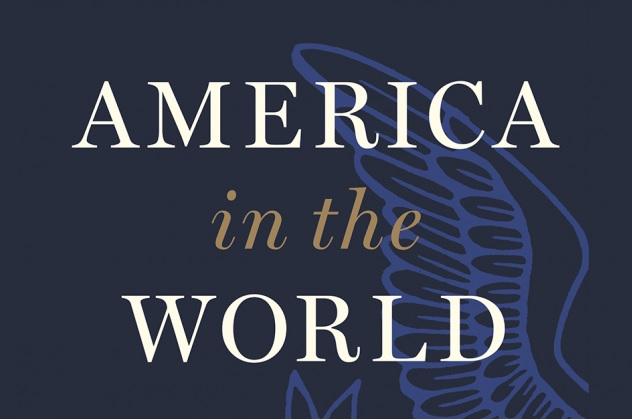From the bookshelf: Zoellick’s ‘America in the world’
Posted By Robert Wihtol on November 2, 2020 @ 12:30

Robert B. Zoellick is a pillar of the US foreign policy establishment. He has served as deputy secretary, under-secretary and counsellor in the State Department; counsellor to the secretary of the Treasury; US Trade Representative; deputy White House chief of staff; and president of the World Bank.
Zoellick’s assignments spanned foreign policy, trade and international finance. With the publication of America in the world: A history of US diplomacy and foreign policy [1], it now turns out that he’s also an accomplished historian.
The scope of the book is ambitious, taking the reader from US envoy Benjamin Franklin’s efforts to establish relations with France and England in the 1770s through two centuries of diplomacy to the collapse of the Soviet Union in 1991 during the presidency of George H.W. Bush. Zoellick handles the challenge deftly, building the book around a series of essays on key statesmen and their policies.
The book’s broad sweep allows Zoellick, and the reader, to link past and present-day events. President Theodore Roosevelt’s skillful brokering of a peace in Manchuria between Russia and Japan in 1905—for which he was awarded the Nobel Peace Prize—stands in stark contrast to President Donald Trump’s unsuccessful efforts to denuclearise North Korea.
Zoellick reminds us that in the early 1900s, the US was pushing China for an investment agreement and a stable currency, much as it was doing over a century later. The Washington Conference, which following World War I placed strict limits on naval power, offers important lessons for arms-control negotiations with North Korea, Iran and the broader Middle East.
America’s concern with openness of the seas, the rule of law, a rules-based international order and free trade run as themes throughout the book. Cordell Hull, at nearly 12 years the longest serving secretary of state, once noted that ‘a prohibitive protective tariff is a gun that recoils upon ourselves’. Hull pushed through the Reciprocal Trade Act and convinced Congress to delegate authority to the president to negotiate tariff reductions. Trump has used the legislation for precisely the opposite purpose.
Perhaps the most important chapters relate to US-led efforts to establish the post–World War II global order. Compared with previous accounts [2], Zoellick highlights the roles played by Assistant Secretary of State Will Clayton and Senator Arthur Vandenberg. The former worked alongside Director of Policy Planning George Kennan to help Secretary of State George Marshall set up his eponymous plan. Without Vandenberg’s political leadership it would not have been approved by Congress. The Marshall Plan secured Western Europe’s recovery and laid the foundations for its integration, but also triggered a division of Europe that would prevail for four decades.
Zoellick includes an important chapter on the engineer and inventor Vannevar Bush, who presciently recognised the importance of scientific research for foreign policy, with implications to the present day. The 1947 National Security Act established the National Security Council and the Central Intelligence Agency, and also set up the Research and Development Board, to advise the secretary of defence. Zoellick reminds us of the flexibility and efficiency inherent in enterprise-driven R&D, and the disadvantages of state-driven systems.
American foreign policy offers many important lessons. President John Kennedy was inclined to be proactive and considered making concessions to the Soviet Union during the 1961 Berlin crisis. The lesson was to know when to hold back when negotiating from a position of strength. Zoellick ascribes the US failure in Vietnam to President Lyndon Johnson’s strong personal inclinations, poor advice from advisers and an inability to combine military power with effective diplomacy.
The book is rich in anecdotes. When concluding negotiations with President Richard Nixon and National Security Adviser Henry Kissinger in 1972, Chinese Premier Zhou Enlai noted that plum blossoms attain their sublime splendour just as they are about to fall. Similarly, the initiators of great events may not survive to delight in the outcomes. He warned Nixon that he ‘may not be there to see the success’. Kissinger scoffed, but slightly over two years later, Nixon resigned in disgrace [3].
Zoellick is largely impartial, but occasionally his Republican instincts shine through. Ronald Reagan and Bush the elder are clearly his favourite presidents. The latter is no surprise, as Zoellick served under James Baker as Bush’s deputy chief of staff.
Discussing America’s future challenges, Zoellick stresses the importance of alliances and notes that the Trump administration’s transactional diplomacy, ‘relying on threats and uncertainties to increase leverage in making one-off deals’, leaves the US ill prepared.
Will the US recover and emerge once again as a global leader? Zoellick concludes on an optimistic note. Nearly two centuries ago, the French historian Alexis de Tocqueville observed that America’s greatness ‘lies not in being more enlightened than any other nation, but rather in her ability to repair her faults’.
Article printed from The Strategist: https://aspistrategist.ru
URL to article: /from-the-bookshelf-zoellicks-america-in-the-world/
URLs in this post:
[1] America in the world: A history of US diplomacy and foreign policy: https://www.twelvebooks.com/titles/robert-b-zoellick/america-in-the-world/9781538712368/
[2] previous accounts: https://www.foreignaffairs.com/reviews/capsule-review/1986-12-01/wise-men-six-friends-and-world-they-made
[3] Nixon resigned in disgrace: https://www.nytimes.com/2007/02/28/books/28kahn.html
Click here to print.